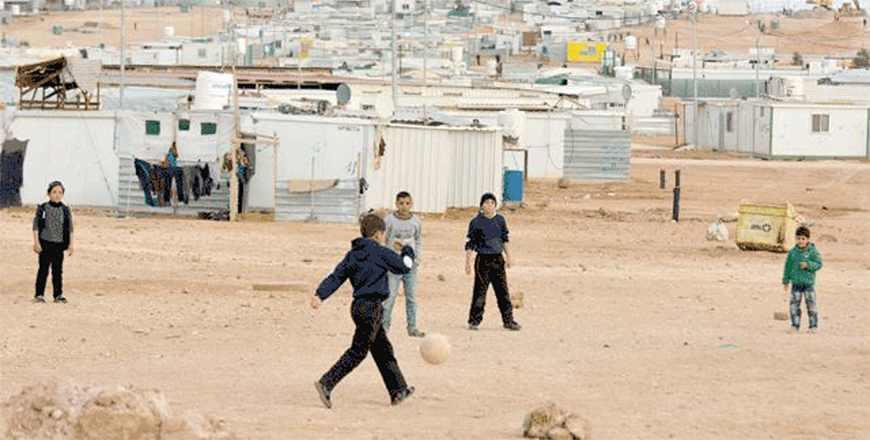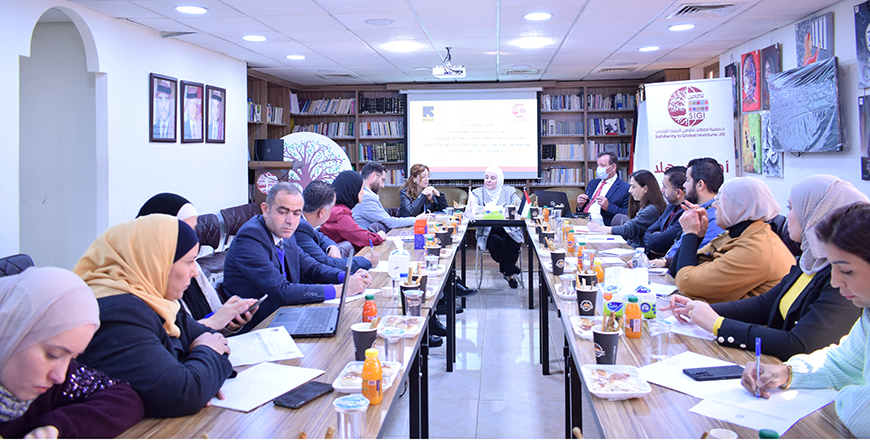You are here
Syrian refugee crisis worsening due to decline in funding – experts
By Rana Tayseer - Feb 29,2024 - Last updated at Feb 29,2024

In this file photo, Syrian refugees are seen at Azraq Camp, around 100km from Amman, in the eastern desert ((JT file photo)
AMMAN — Experts on Wednesday called for increasing aid to Syrian refugees to reduce the decline in funding for Jordan’s response plan to the Syrian crisis.
The volume of funding for Jordan's response plan to the Syrian crisis for last year amounted to 663 million US dollars out of 2.2 billion dollars, at a rate of 29.2 per cent, according to the Ministry of Planning and International Cooperation, which indicated that the value of the deficit in financing the plan amounted to approximately 1.612 billion dollars at a rate of 70.8 per cent.
Grants for the response plan were distributed among its components, amounting to 142.9 million dollars to support service projects in host communities, out of requirements amounting to 545 million dollars, with a funding rate of 26.2 per cent, in addition to 31.4 million dollars to support the general budget, out of requirements. They amounted to 959 million dollars, with a funding ratio of 3.3 per cent, and 489 million dollars to support Syrian refugees, out of allocations amounting to 771 million dollars, with a funding rate of 63.4 per cent, according to a report.
The US was on the top of list of donors for the plan and then was Germany and third was the EU.
Economist Hosam Ayesh told The Jordan Times on Wednesday that the government bears a large cost and burden as a result of the decrease in funding for Jordan’s response plan to the Syrian crisis, and this is reflected in those entitled to support and assistance at the health and educational levels and the local environments hosting these refugees.
“In addition the budget deficit is affected as funds to this plan usually support the state budget”, he added.
Ayesh said that the government must identify the reasons that lead to this decline and try to reduce the gap that leads to this decline.
Donors often justify that the crisis in Ukraine and the need of Ukrainian refugees diverted a large portion of the Jordanian response plan's aid to Europe, Ayesh added.
“Jordan is required to coordinate with other countries hosting these refugees so that its voice is stronger in terms of pressuring donors and reminding donors that Jordan has fulfilled its pledges regarding permits for Syrians to economic zones and the professions in which they work without obstacles”, he said.
Economist Wajdi Makhamreh said that the Syrian refugee crisis has begun to worsen in Jordan in light of the decline in countries supporting funding for refugees in Jordan because there have become other priorities, including the Ukraine crisis and several crises in Europe that have contributed to a significant decline in this funding.
This decline in funding has clearly affected Jordan, because there were promises of funding before Jordan hosted these refugees, and Jordan does not bear a large cost regarding the issue of refugees, Makhamreh said.
“This puts great pressure on Jordan and its budget because a large portion of the costs related to refugees will be financed by Jordan, such as infrastructure and health costs, in addition to financing the Zaatari camp and many other matters that the government may bear”, Makhamreh added.
There must be continued support and demand from Jordan because it is unable to bear this cost, and measures must be taken to pressure donor countries to refinance the refugees, either through diplomatic efforts or threatening to return a portion of the refugees to their countries, he said.
Jordan has hosted more than 1.3 million Syrians since the beginning of the crisis in 2011, including nearly 660,000 refugees registered with the United Nations High Commissioner for Refugees, out of more than 5 million Syrian refugees in Jordan and neighboring countries.
Minister of Planning, ZeinaTouqan, referred in a recent statement to the decline in support directed to the plan, calling on the international community to fulfill its pledges towards the countries hosting refugees, indicating that reducing the amount of monetary support or interrupting it will lead to an increase in the fragility of refugees and will push them to search for alternative ways to provide their needs.
In 2022, the volume of financing for Jordan’s response plan to the Syrian crisis reached 760.3 million dollars out of 2.28 billion dollars, with a financing ratio of 33.4 per cent, and a deficit amounted to 1.51 billion dollars.
Related Articles
AMMAN — Additional aid to Jordan is vital, according to economists, after a UNICEF report highlighted that more than one million children in
AMMAN — The Solidarity Is Global Institute (SIGI) on Tuesday held a dialogue session on the “Jordan Response Plan for the Syria Crisis (JRP)
AMMAN — Funding for the Jordan Response Plan (JRP), the national response to the Syrian refugee crisis, stands at $125 million, some 5.1 per


















